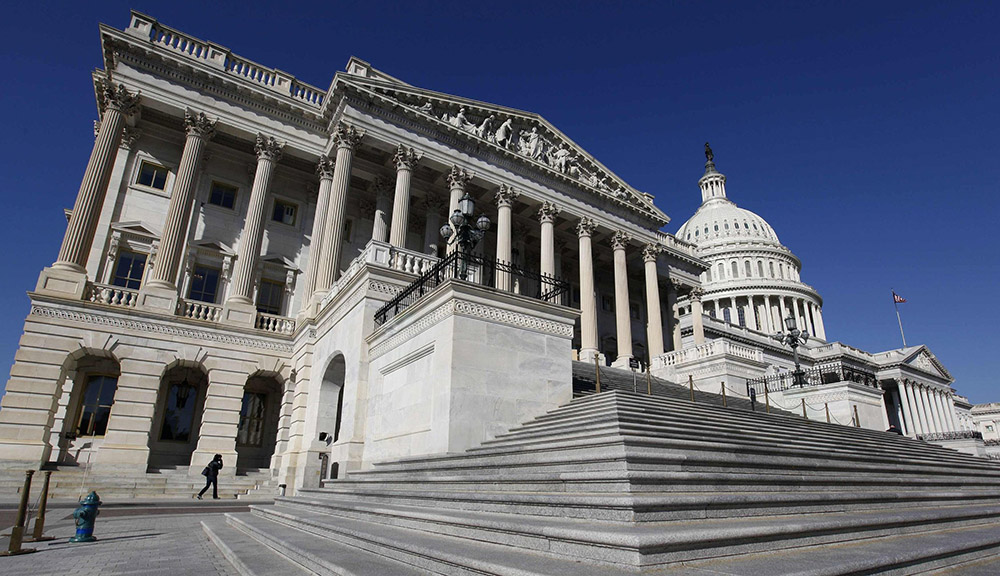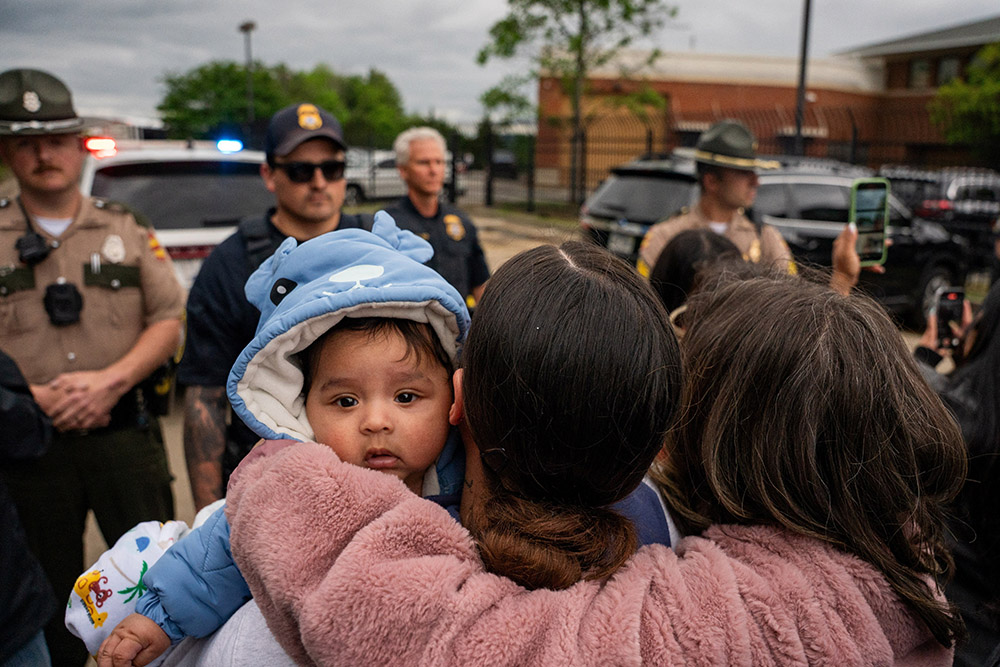
A file photo shows the entrance to the House of Representatives on Capitol Hill in Washington. (OSV News/Reuters/Larry Downing)
While some religious leaders are loudly condemning the Trump administration's budget policies and getting arrested for demonstrating against them, the U.S. Catholic bishops are quietly criticizing the administration in a letter to Capitol Hill — but not demonstrating.
The U.S. Conference of Catholic Bishops practices a "go-it-alone" political strategy, not joining with other religious leaders in common statements, demonstrating or getting arrested on Capitol Hill. Nor are they seen demonstrating on the streets of Los Angeles or other cities where U.S. Immigration and Customs Enforcement is arresting and deporting undocumented working migrants who are not criminals.
In his homily at a Mass for peace, Los Angeles Archbishop José Gomez did not even use the words immigrant or ICE but spoke in generalities about peace.
A few bishops, like Archbishop Edward Weisenburger of Detroit and Archbishop John Wester of Santa Fe, New Mexico, have spoken out on their own, but most have been silent.
The bishops' conference prefers a less dramatic approach, quietly criticizing the administration in a comprehensive letter to members of Congress. The May 20 letter was signed by the chairs of six major conference committees, indicating the wide support for the positions taken in the letter.
On President Donald Trump's "One Big Beautiful Bill Act," the bishops commended "parts of the budget proposal that will support human life and dignity, while also strongly encouraging [lawmakers] to reconsider provisions that will harm the poor and disadvantaged, our immigrant brothers and sisters, and our environment."
Sadly, this letter is getting little or no attention in either the secular or religious media, despite a press release announcing the letter. Other than issuing a press release, the bishops' conference did little to publicize its letter.
Advertisement
In their letter, the bishops "strongly support ending taxpayer subsidization of major abortion and 'gender transition' providers like Planned Parenthood." To these topics, the bishops devoted one brief paragraph in their letter and two longer paragraphs in its appendix. The bishops also support the tax credits for private schools in the bill.
Perhaps it is support for these provisions that keeps the bishops from attacking the bill as a whole as do other religious leaders. But the rest of the seven-page letter is devoted to detailed critiques of the Republican budget on taxes, health care, immigration, the environment and aid to the poor.
The House bill "will raise income taxes on the working poor while simultaneously providing a large tax cut for the wealthy," explain the bishops.
"More than half of the $3 trillion deficit is from the continued virtual elimination of the Alternative Minimum Tax (AMT)," they note, "which was designed to prevent high-income earners from avoiding tax liability through excessive use of credits and loopholes, and the raising of estate tax thresholds to $15 million. These benefits will go almost exclusively to the highest income households. The bill should be fixed so that the risks taken fall on those who stand to benefit most rather than on those who struggle on the margins of society."
The bishops' letter complains that "in order to help pay for the tax cuts, the bill cuts aspects of Medicaid, [Affordable Care Act] premium tax credits, and SNAP [the Supplemental Nutrition Assistance Program]."
The combined health provisions of the bill will cause more than 13 million people to lose their health insurance, they note in the letter. Most Medicaid recipients work, "and work requirements ignore the realities of low-wage work, caregiving responsibilities, and health limitations. These requirements will not support people looking for work, creating artificial barriers to care through excessive red tape."
They also object to limiting "access to healthcare for many lawfully present, taxpaying immigrants."
"The changes to SNAP will mean that millions will go hungry," complain the bishops. "These provisions are unconscionable and unacceptable," they conclude.
The bishops object that "provisions in this package also double down on an unsustainable enforcement-only approach to immigration, while unjustly placing immigrant and mixed-status families at a profound disadvantage."
"This bill includes several provisions," the bishops point out, "that would override protections for unaccompanied children and potentially keep them separated from their families."
The letter complains of "the unprecedented levels of mandatory funding that would escalate enforcement far beyond the legitimate goals of promoting public safety and bringing to justice those who commit crimes."
This is "contrary to the common good," write the bishops, who cite Pope Francis in saying, "an authentic rule of law is verified precisely in the dignified treatment that all people deserve, especially the poorest and most marginalized."

A mother holds her child as multiple immigrant rights groups gather at the Department of Homeland Security field office in Nashville, Tenn., to protest what they believe to be a multi-agency operation to detain noncitizens overnight in Nashville, May 4, 2025. (OSV News/Reuters/Seth Herald)
The bishops also raise an alarm on "the $500 billion cut to clean energy incentives and the repeal of environmental justice programs and energy efficient loans," arguing the cuts will "create significant barriers to accessing clean energy, especially for rural and urban poor and middle-income families."
These cuts "will also increase pollution that affects children and the unborn, blunt economic opportunities, and decrease resilience against extreme weather," say the bishops. "Furthermore, this bill makes it harder for clean energy companies to operate and create good jobs. Removing environmental review requirements from permitting and processes will hinder good stewardship."
It would be difficult to find a more objective and detailed critique of the Republican budget bill than that given by the U.S. Catholic bishops, but the media only pays attention when the bishops object to abortion and gender policy. Few people know of the bishops' objections to Republican budgetary policies. This is as much the bishops' fault for not promoting their positions as the media's for ignoring them.
Theologians often speak of Catholic social teaching as the church's best-kept secret. It is not taught or preached. Likewise, the U.S. bishops' position on public policy is the American church's best kept secret. The bishops are willing to whisper it to members of Congress but not shout it in the streets.
The bishops have written a good letter, but in today's media landscape, they need to do more than that. They need a sophisticated media strategy to get their message out. It takes more than a letter to move Congress.





